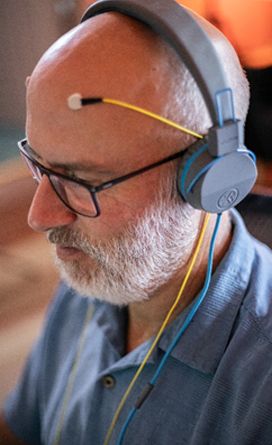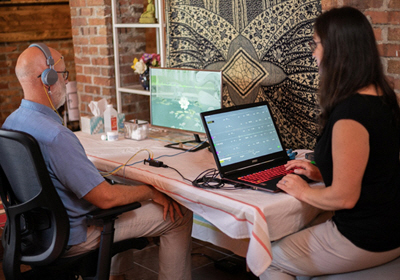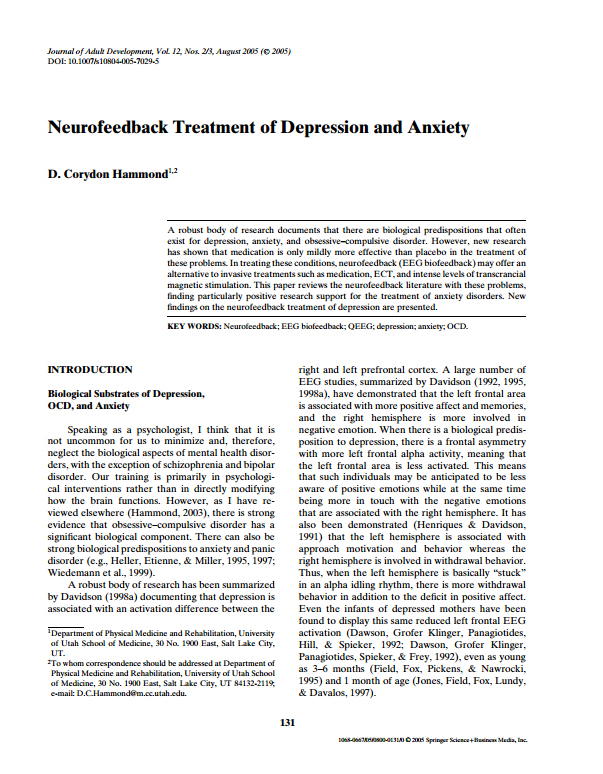What is neurofeedback?
Neurofeedback is a simple non-invasive way of training your brain to work more efficiently without medication.
Brains are plastic, which means they can change when given feedback in response to the EEG (measure of electrical activity in the brain). Brains also change based on any task that you repeatedly practice, such as learning to play piano.
Like a game of hot and cold, the computer software encourages or discourages certain brainwave frequencies with audio/visual feedback. Based on our assessments, we will choose an individualized protocol for you to optimize your brain function.
 From anxious to calm
From anxious to calm
Lisa’s mind was usually racing repetitively over all the things she needed to take care of in her life – her job responsibilities, her kids’ needs, analyzing her relationship with her husband, her worries about her own health, the grocery list, and on and on.
It seemed Lisa could never let go and feel still or quiet her mind. When driving, her mind was racing. When giving her son a bath, her mind was racing. And especially when trying to fall asleep at night, her mind gave her no peace.
Lisa also felt depressed sometimes and had tried medication, but she didn’t want to tolerate the bad side-effects. She tried meditation but couldn’t settle down.
But she was managing life okay, as long as she didn’t forget anything. She felt trapped by the rumination and pictured herself as the bunny in the old Energizer battery commercial… beating her drum and bumping into the corner repeatedly without making forward progress or being able to stop.
 When nothing else seemed to work, Lisa decided to try neurofeedback.
When nothing else seemed to work, Lisa decided to try neurofeedback.
After the first session, she felt the “clear windshield effect” which lasted a few hours during which time her mind did not race, and it seemed everything she looked at was bright and shiny. She was able to easily make a phone call she’d been dreading and postponing. She was more present with her family. She felt able to decide about groceries and then stop thinking about it.
After the second session, Lisa didn’t get the same result but instead felt very tired and went home for a nap. She awoke from a deep, 90-minute sleep feeling fresher and more vibrant than she could remember being in months.
After each session, there was a somewhat variable reaction, but she noticed a longer and longer positive effect on quieting her mind. Once she had done neurofeedback training for about 25 sessions, the effects were sustained between appointments. She had lost a few pounds because of reduced stress-eating. Her sleep had improved, and, best of all, at many times during the day she noticed how quiet, calm, and focused she felt while still accomplishing her tasks.
 Better flexibility and focus
Better flexibility and focus
Neurofeedback is about helping your brain and your nervous system have an appropriate level of activity for a given task and better flexibility for switching between tasks.
When your brain is producing inappropriate frequencies for the task, you are not functioning as well as you could be. And when your nervous system is either hyper-alert or too sluggish, then you aren’t functioning optimally.
When your nervous system is regulated, you can choose where to place your attention instead of being pulled around constantly by your environment or by your internal storytelling.
 How does neurofeedback help you?
How does neurofeedback help you?
Symptoms of ADHD, anxiety, depression, sleep problems, and many other things have been successfully relieved with neurofeedback. It also is used for performance enhancement by athletes and musicians.
What ages of people can do neurofeedback?
We work with kids as young as 6, and you’re never too old to benefit from it. Our brains continue to learn and change throughout our lives.
Neurofeedback in our office
We offer neurofeedback sessions which include heart rate variability biofeedback.
We also provide brain maps, otherwise known as QEEG brain maps.
By regulating your nervous system with neurofeedback, we believe the benefits of psychotherapy increase, and lifestyle changes become easier to implement. It’s like updating the hardware before installing new software.
 What to expect from a neurofeedback session?
What to expect from a neurofeedback session?
When you sit down for a brain-training session, typically five sensors are attached to your scalp and ears with a dot of washable paste. You then watch a simple video game or a movie and receive visual feedback as well as audio feedback through headphones.
When the brain is meeting the goals, it will be rewarded. Visual reward is the movie becoming brighter or the game going faster/earning more points. Audio reward is a series of beeps or tones.
The computer software is programmed for you individually to encourage some electrical frequencies and discourage others. The training session involves watching the computer screen for up to 30 minutes.
How many times do you need to do it and how often?
Because it is a subconscious learning process and not instantaneous, clients typically need 40 – 50 sessions of neurofeedback to establish lasting benefit. It is best to do neurofeedback once or twice a week. It is possible to do it twice a month, but progress will be slower.
Call (828) 338-3200 or email us (fulfilledlifelpc@gmail.com) to discuss if neurofeedback is the right service for you.
Research articles
American Academy of Pediatrics endorsed neurofeedback in 2012 as a “Level 1 Best Support Intervention” for attention and hyperactivity behavioral problems.
American Academy of Child and Adolescent Psychiatry endorsed neurofeedback (aka EEG biofeedback) in 2005 as meeting the clinical treatment criteria for ADHD, anxiety (PTSD, GAD, OCD, phobias), depression, reading disabilities, addiction disorders, and seizure disorders.
https://neurodevelopmentcenter.com/wp-content/uploads/2013/01/Emerging-Interventions-chapter.pdf
Research articles 
Call (828) 338-3200 or email us (fulfilledlifelpc@gmail.com) to discuss if neurofeedback is the right service for you.
What clients are saying
“… the effects of the last session, I must say, have been so wonderful! My heart rate while interacting with others feels to be a lot lower than usual considering that I haven’t felt nearly as anxious nor have I noticed the shortness of breath that I usually experience while talking. Things feel much calmer and clearer! I’m really looking forward to the next session.”
“last night I fell asleep without needing any noise playing in the back ground. And I slept very soundly. I have been calm most of the day. They are laying off a lot of long-time employees here where I work, and normally that would send me into fear mode, but I am also calm through this event and not letting it get to me. I look forward to the next session.”
“I’ve been getting more work done at school and actually taking notes in class because it’s easier to pay attention.”
Call (828) 338-3200 or email us (fulfilledlifelpc@gmail.com) to discuss if neurofeedback is the right service for you.

